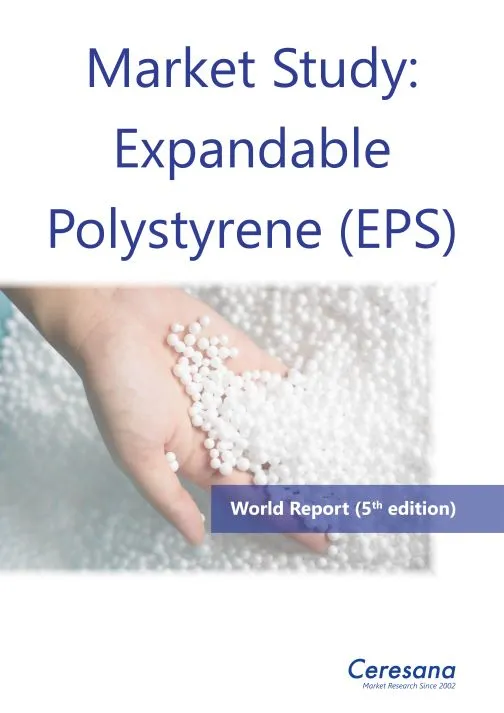Rising energy costs are fueling the market for insulation materials, despite a weakening construction industry. This is hardly surprising, since the energy savings made possible by thermal insulation exceed the cost many times over. In Germany, for example, an uninsulated house wall loses the equivalent of around 158 liters of heating oil per square meter within 20 years, whereas a very well insulated wall loses only 20 liters. Ceresana has investigated the world market for the best-selling insulation material: EPS foam. Traded under brand names such as Styropor or Airpop, it is the most widely used insulation material in the world. According to the latest, and already fifth, edition of the „Expandable Polystyrene“ market study, a total of around 7.2 million tonnes of EPS was consumed worldwide in 2022 – half a million tonnes more than five years ago.
EPS Renews the European Union
In Europe, real estate is still responsible for more than one third of final energy consumption and greenhouse gas emissions. Better building insulation is therefore a key objective of the „European Green Deal“. In 2020, the EU Commission published the Renovation Wave Strategy: by 2030, EU states are to invest around EUR 200 billion a year in the energy modernization of homes and public buildings. Despite Brexit, the United Kingdom is also aligning itself with the European Energy Performance of Buildings Directive. Manufacturers and processors of expandable polystyrene are benefiting particularly from these initiatives. So far, however, efforts have varied from region to region: in Italy, the EU targets would not be reached for another 3,800 years at the current rate of renovation.
Insulation and Packaging as Main Applications
EPS is a light, strong foam that can be shaped almost at will. The versatile material consists mainly of air and the foamed plastic polystyrene, plus flame retardants and other additives, for example graphite. Construction products are the main application for EPS, accounting for around 53% of global demand. The construction industry uses the low-cost insulation material primarily to provide heat, cold and sound insulation for both new housing and the renovation of old buildings. Alternatives to EPS are glass and rock wool, and increasingly also insulation materials based on renewable raw materials. In Asia-Pacific and the Americas in particular, EPS is used not only for insulation purposes but also on a large scale for packaging, for example for beverage cups, fish boxes or the transport of electronic products. Worldwide, packaging accounts for over 41% of EPS demand. Especially in emerging and developing countries, the per capita demand for EPS packaging is increasing. Asia-Pacific accounts for the highest overall EPS demand, with around 57% of global EPS consumption in 2022.
Fifth edition of the Ceresana market study “Expandable Polystyrene – EPS”
Chapter 1 looks at the world market for Expandable Polystyrene: EPS production and demand volumes as well as import, export and revenues generated are given for the regions of Western and Eastern Europe, North and South America, Asia-Pacific, the Middle East and Africa. Forecasts up to 2032 are provided for this purpose. Chapter 2 analyzes EPS market data for the 25 most important countries, that is, country-specific production and demand volumes, import and export figures, and revenue volumes for each. Furthermore, the demand for EPS is broken down for various application areas: packaging, construction, industry, as well as other applications. Chapter 3 is a useful directory: Company profiles of the most significant EPS manufacturers, clearly arranged by contact details, revenue, profit, product range, production facilities, production capacities and brief profile are given. Detailed profiles are provided by 46 manufacturers, such as Alpek, BASF, Epsilyte, Loyal, Ming Dih, SIBUR, Sunpor, SPL, Synthos, and Wuxi Xingda. Further information about the market study “Expandable Polystyrene – EPS” (5th edition): https://ceresana.com/en/produkt/expandable-polystyrene-market-report

About Ceresana
As one of the world’s leading market research institutes, Ceresana specializes in the chemicals, plastics, packaging, and industrial goods sectors. Special focus areas are bio-economy and automotive / mobility. Since 2002, companies have benefited from high-quality industry analyses and forecasts. Over 250 market studies provide more than 10,000 clients around the world with the knowledge base for sustainable success. More about Ceresana at www.ceresana.com
Ceresana
Mainaustrasse 34
78464 Konstanz
Germany
Press Contact: Martin Ebner, m.ebner@ceresana.com
